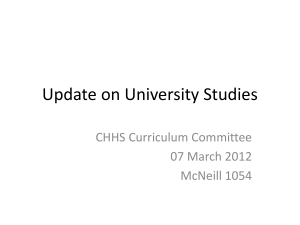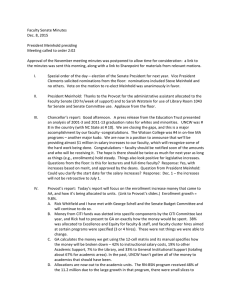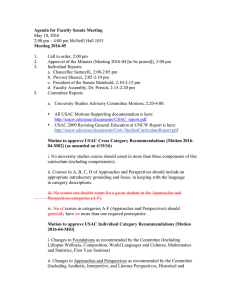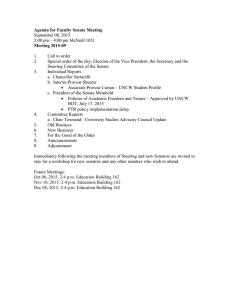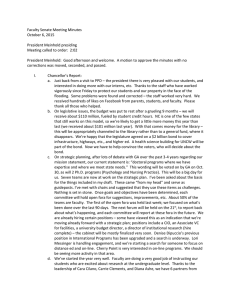Document 12007423
advertisement
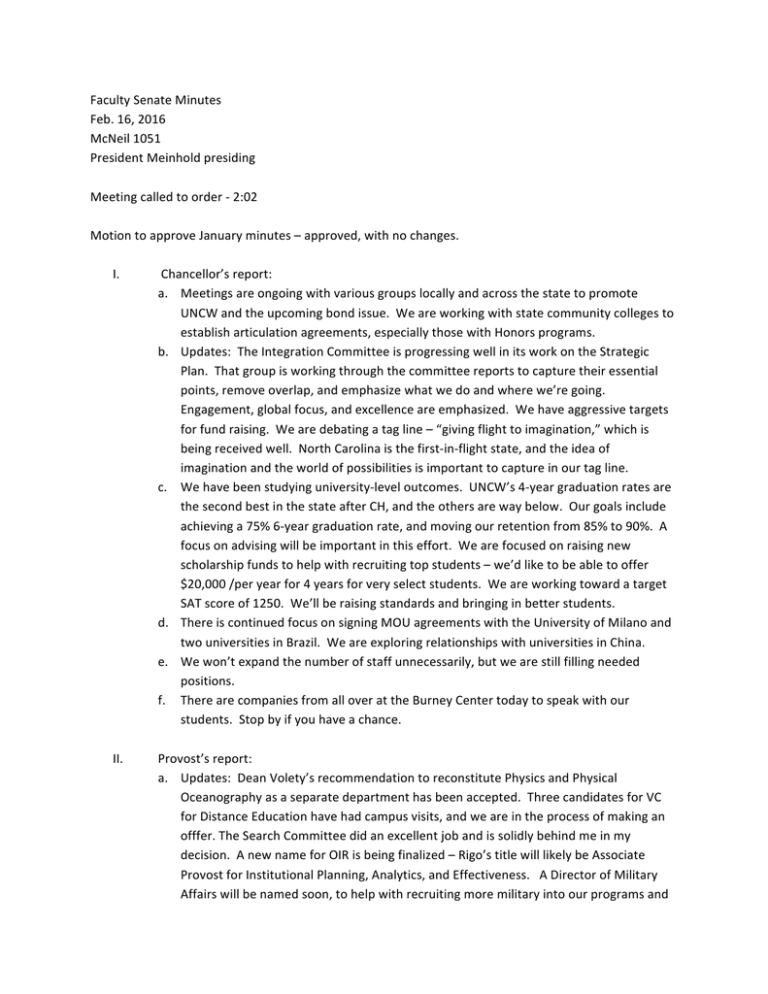
Faculty Senate Minutes Feb. 16, 2016 McNeil 1051 President Meinhold presiding Meeting called to order -­‐ 2:02 Motion to approve January minutes – approved, with no changes. I. Chancellor’s report: a. Meetings are ongoing with various groups locally and across the state to promote UNCW and the upcoming bond issue. We are working with state community colleges to establish articulation agreements, especially those with Honors programs. b. Updates: The Integration Committee is progressing well in its work on the Strategic Plan. That group is working through the committee reports to capture their essential points, remove overlap, and emphasize what we do and where we’re going. Engagement, global focus, and excellence are emphasized. We have aggressive targets for fund raising. We are debating a tag line – “giving flight to imagination,” which is being received well. North Carolina is the first-­‐in-­‐flight state, and the idea of imagination and the world of possibilities is important to capture in our tag line. c. We have been studying university-­‐level outcomes. UNCW’s 4-­‐year graduation rates are the second best in the state after CH, and the others are way below. Our goals include achieving a 75% 6-­‐year graduation rate, and moving our retention from 85% to 90%. A focus on advising will be important in this effort. We are focused on raising new scholarship funds to help with recruiting top students – we’d like to be able to offer $20,000 /per year for 4 years for very select students. We are working toward a target SAT score of 1250. We’ll be raising standards and bringing in better students. d. There is continued focus on signing MOU agreements with the University of Milano and two universities in Brazil. We are exploring relationships with universities in China. e. We won’t expand the number of staff unnecessarily, but we are still filling needed positions. f. There are companies from all over at the Burney Center today to speak with our students. Stop by if you have a chance. II. Provost’s report: a. Updates: Dean Volety’s recommendation to reconstitute Physics and Physical Oceanography as a separate department has been accepted. Three candidates for VC for Distance Education have had campus visits, and we are in the process of making an offfer. The Search Committee did an excellent job and is solidly behind me in my decision. A new name for OIR is being finalized – Rigo’s title will likely be Associate Provost for Institutional Planning, Analytics, and Effectiveness. A Director of Military Affairs will be named soon, to help with recruiting more military into our programs and III. to coordinate services for our military on campus. Our BOT also has a new Military Committee. There are two finalists for our Associate VC and Dean of Undergraduate Studies search. A decision will be made in the near future. There is lots of positive energy now at CMS. b. The Provost is working with Sharon Boyd on business processes that aren’t working well. The Provost’s advisory council will generate a list of processes that aren’t working well and map the processes to figure out how to improve them internally, particularly with respect to their impact on academics. Drew Rosen will be involved in this effort. The Provost is actively working to include faculty with relevant academic expertise in various operational matters, and Drew does work in business processes. President’s report: a. Senate meetings for the rest of the semester will be held here in McNeil. b. Our new administrative assistant will be on board by the end of the month. She will be available to help Senate committees, as well as the body as a whole. c. Gabriel Lugo reported on behalf of FA – there is lots going on “upstairs”. GA board meetings, including members of the legislature, have been scary. Tenure, ideological balance, and student success are being discussed. NC Gap, a proposal currently under discussion, is North Carolina’s version of “drowning the bunnies”. Important health care changes were buried in legislation. They’ve now backed away from some of the changes, but premiums will probably double for regular faculty, so we have a pay cut. s Proposed reductions in tuition and fees for HBIs have ulterior motives. Many regular channels have been bypassed in discussion of these measures – these are the same strategies that gave rise to PTR actions, etc. The BOG retreat was interesting – only two faculty were included. The meetings were contentious and included a report on the effectiveness of the Board. Relevant documents are on our Sharepoint site. As examples, the report shows that over 70% of the Board don’t know what their job is, or what the policies are. 62% of the BOG haven’t yet read the strategic plan and aren’t invested in it because they weren’t here when it was created. Senators should read the report and draw their own conclusions. The FA is still fighting PTR changes. We did before and lost, but we’re still trying to get administration to back away from this unneeded legislation. Spellings made remarks at the retreat that seemed to be on the other side of the BOG, suggesting that the BOG should restrict itself to governance, appoint good Chancellors who will appoint good personnel, and then leave them alone. A final report on Assessment of Competencies is coming from FA. Spellings has been asked not to change the document. There is hope that she will side with the report and protect its integrity. COACHE data are out and should be available at the system level. The item of biggest concern to faculty is salaries, as an indicator of respect for faculty and education. There are some concerns that a providing a small raise might be seen as a way to correct all problems. IV. d. Meinhold – we have just received the COACHE data for UNCW. Faculty are working with these data now. A report will go to Steering and to the Senate Faculty Welfare Committee, who will report to this body, probably in April. Committee reports: a. From the UCC i. Motion 2016-­‐02-­‐MO1: Establish Minor in Japanese. UCC recommends the establishment of a minor in Japanese, to be offered through the Dept of World Languages and Cultures. 1. The minor will use existing classes, the exchange, and study abroad options, and will help to recognize student’s work in Japanese more formally. This 18-­‐credit minor will help the students more after they graduate. 2. Question from the Chancellor – Japanese is not a growing language, so why Japanese instead of Chinese? Demand will be small (3-­‐5 students). An extensive analysis of demand is needed. Response -­‐ we have increasing numbers of students who have had Japanese in high school and want more advanced studies. We have healthy enrollments in these classes, while our Chinese classes struggle. FST has helped. There is a strong emphasis in NC schools on Japanese, which has interested students in wanting a second concentration. Establishing this minor doesn’t require any additional resources. 3. The question was called, and the motion passed unanimously. ii. Motion 2016-­‐02-­‐M02 – Establish BA/MA in English. 1. This program will serve as a pathway for ENG students who are devoted and high performing. It is an attempt to keep some of our best students here for graduate study, to streamline the process for them. We don’t have much money for our grad students, so this would help them financially. 2. Discussion from the floor: How is that something wouldn’t be lost? Advanced coursework would have to start early, in the sophomore year. How are the grad level courses appropriate for undergrads. Could undergrads be TAs? What if extenuating circumstances prevent a student from being able to finish by the prescribed timeline? Response: the program is directed specifically to very advanced undergrads, and some do qualify for the advanced work. Less capable students are not being targeted here. We don’t expect TAs to be available to undergrads. If someone can’t finish, that would be up to discretion of the director, as usual. Question: the document says if students don’t graduate in 5 years, the classes can’t be applied to the BA degree. Do they have to take other classes? Response -­‐ yes, we offer enough classes for them to be able to complete the degree. Question: what’s the planned size for this program? Response -­‐ Our numbers have dropped from about fifty 15 years ago to our current class of about 15 students, and we’re attempting to bolster those numbers. We expect 3-­‐ 4 students in this program at any given time, allowing these students to stay at UNCW rather than going to other schools. Question: is there precedent in the state for ENG? What is the cumulative experience (thesis, internship)? Is this a change from the current program? Response: the program is modeled after similar programs in other departments here at UNCW – similar programs do exist in the country (not sure about in the state). Our current program doesn’t require a thesis. 3. The question was called, and the motion carried. iii. Meinhold -­‐ These discussions about curriculum matters are the sort of healthy debate we should be having. You are encouraged to engage in these debates. The proposals have been vetted prior to coming before this body. I had a call this morning about the pathway for curriculum matters, and will be asking Steering to consider constructing visuals that describe the vetting prior to proposals appearing before this body. b. Report from USAC by Paul Townend – on progress since the last Senate meeting in Jan. i. Today will be largely informational. Department chairs and program directors have received the proposed revisions. Today we’ll show you where the proposed changes are and highlights of what we’re proposing -­‐ not so much for back and forth today, but just to explain where we are. The USAC website has a link that includes all of the data considered by the USAC, the details of the faculty survey, and specific recommendations. Thanks to the departments and individuals who have provided feedback and we want more. At the forum last week, people asked if this was a done deal. It’s all a work in progress and we want feedback. A month was built into the process to provide time for review of all the feedback we receive and for incorporation of that feedback as appropriate. We’ve also heard, “don’t we have enough to do and didn’t we just finish building this curriculum”? We’re sympathetic to this, but it would be professionally weak for us not to reconsider how US is working. We have to make tweaks as needed. The spirit of the reforms is along the lines of revising a course. No changes have been made since the initial implementation of US. A review is needed. If you dig into the survey, 63% said the curriculum is too difficult to advise, and 92% said we should consider cutting components. That feedback has informed the USAC recommendations. We want to keep a robust gen ed curriculum, with buy-­‐in from faculty and students. The suggested changes are mainly to streamline, clarify, and revise SLOs and categories – to simplify, and increase flexibility. ii. From Jennifer Horan – this review is a process. The USAC doesn’t own the curriculum. For Approaches & Perspectives, the Registrar provided information on how students were progressing through the curriculum. There’s one double count in A&P. We looked at how many courses are double counting -­‐ this is one of the things that contributes to confusion. It is difficult to keep track of as an advisor. There are barriers in LDN and LGS categories because many of those courses have pre-­‐requisites. A few departments have courses in lots of categories, which defeats the purpose of broad coverage. We can eliminate the problem with double-­‐counting. A major concern indicated in the faculty survey (about 300) was that some departments are gaming the curriculum. Some SLOs have been changed to increase focus on disciplinary emphases (although there are places for multidisciplinary foci). Departments should review the changes for each category in which they have a course. iii. Discussion from the floor: 1. It isn’t exactly true that taking one course satisfies multiple hours – students still need a certain number of hours. Some gaming the system is due to people gaming processes that they don’t think have value. In reviewing responses, the committee should think about why people might feel they need to game the system. 2. A subcommittee reviewed data with a focus on competencies, and came up with suggestions for some categories. There were not many issues with Explorations and the Capstone. Clusters were a problem area – lots of faculty suggested dropping the requirement. We looked at the original purpose of clusters – to connect disciplines -­‐ but it appears that this is a difficulty area. Our suggestion is to drop the cluster requirement or make it optional, and to adopt a multidisciplinary focus in other places. In building competencies, WI was intended to be within the discipline. The majority of courses addressing writing are at upper level, so there are concerns that writing instruction isn’t happening early enough. Also, the SLOs haven’t been explicit enough in emphasizing writing as a process, we have suggested changes to the SLOs. We’ve asked departments to look closely to see if they have a required sequence of courses for WI, rather than having them only at the end. There are similar issues for IL, with most courses at the upper levels and questions about whether students are really addressing IL, or just learning reference styles. Again, the committee has tried to clarify SLOs and have them addressed at lower level. QLR might be dropped and combined with the capstone to emphasize critical thinking. 3. Combining QLR & the Capstone would be a big choice. The thinking is that a majority of the classes currently in these categories will probably still be good fits. Currently capstones don’t have learning outcomes, so these might be clarified in a combination critical thinking category, which would likely have a 1-­‐4 hr requirement because lots of departments have variations in this range that could still be good fits. 4. Professional standards have changed for what constitutes IL, which we would be smart to reflect. Our recommendations will have implications for some programs. Please review the recommendations carefully and give us feedback. 5. Recommendations will also include: limiting any given course to three categories; no double-­‐counting for A&P; A&P courses should include appropriate disciplinary grounding and focus, in keeping with the language of the category descriptions; and no courses in A&P should have required prerequisites. 6. Did the USAC consider difficulties for transfer students? Yes, there were lots of meetings to consider this issue, which is bigger than just the US curriculum. Our suggestions (e.g., cutting categories) may help. We want feedback about things that could help these students. 7. It was a principle of the old basic studies that no courses could have prereqs. And we did well with that curriculum. 8. Has there been any negative feedback from departments about a negative impact from removing double counts? Students under full US are only now beginning to graduate, so it is difficult to answer questions about the impact of US. However, the number of hours taken to graduation hasn’t changed – there is no increasing trend in the data. These suggested changes may reduce flexibility in some cases, but for most it will increase flexibility. It will be a program-­‐by-­‐program issue, and will depend on how departments respond to these new rules. We all share this. We must make it work for our students, so this is a concern. This is the time to suggest helpful modifications. 9. The strongest push back has come from the professional schools, especially with respect to clusters. The suggestion to remove clusters was in response to that – to address pressure on credit hours and for transfers. There has been an increase in the number of students with minors. 10. There needs to be a go-­‐to unit in charge of training advisors. Folks are scared that they will result in a student taking longer to graduate. This is particularly important when requirements change. 11. With respect to A&P, lots of science majors come in with advanced courses. If they have to use courses with no pre-­‐reqs to fill requirements, does that mean that students have to go back and take lower level courses? This would hold for a number of science, math, and language courses. Clearly there will need to be exceptions possible, which adds complexity. We tried for general rules that would benefit most. 12. How could clusters work as an “optional requirement”? Some majors may want to require these. There are lots of ways to build an individual student’s curriculum, and lots of good clusters that students may want to take. Good thought and planning went into some of the clusters. 13. How does the committee envision that new SLOs will impact courses that are already in categories? The committee has been discussing this with no clear answer yet. We’d like your feedback on this too. GA says that we need a program of regular review. There needs to be a structured process anyway. Departments are going to have to review what they’ve got and decide if their courses meet the new requirements. 14. Students need at least 124 hours to graduate. This curriculum is 60-­‐ some hours. We have to be sensitive to the fact that students are paying for this and going into debt iv. Meinhold -­‐ I attended last USAC meeting to thank them for their work. They’ve been doing a lot of work. There will be vacancies on that committee. Another forum will be held on Thursday – 162 ED, 12-­‐2:00. We have two choices as a body. The USAC recommendations won’t be in motion form until April. We could activate our May meeting, or consider the recommendations in April. My preference is to work closely to prepare a series of motions, presented first to Steering, and then put on the April agenda, so that we might proceed with manageable motions. V. Good of the order: From the floor -­‐ at the last Senate meeting, there were votes where it wasn’t clear to me whether yea or nay won. There are alternatives to voice vote. Response: A senator can always call for division. We used clickers last year. We’ll have an administrative assistant soon who can help with organization, so clickers may come back. This also allows for anonymity. Meeting adjourned: 3:39
